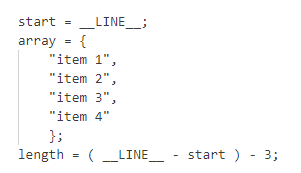What? There is no lib module.
$ python3.13 -c 'import lib'
Traceback (most recent call last):
File "<string>", line 1, in <module>
import lib
ModuleNotFoundError: No module named 'lib'
$
Post funny things about programming here! (Or just rant about your favourite programming language.)
What? There is no lib module.
$ python3.13 -c 'import lib'
Traceback (most recent call last):
File "<string>", line 1, in <module>
import lib
ModuleNotFoundError: No module named 'lib'
$
OP wrote this add() function and has provided their own lib module in the source code.
Thank you, I hate it
That's disgusting
As if I needed more reasons to start away from python
You can so stupid shit in any language. I admit Python doesn't exactly make it difficult. A bit like JS, but different.
Implementation of the add() function is here: https://github.com/raldone01/python_lessons_py/blob/main/lib.py
Yup, the function actually goes and finds the code that calls it and parses the comment.
Disgusting.
I feel sick
This does not actually work, right? Right?
Anakin:
Anakin:
The add() function (that is available in the source code) basically uses some built in debugging tools to find out where in the code the function is called, and then parses the comment from the file and uses it for adding stuff.
I’ve never tried (becuse why would you…) but something similar can probably be built in any interpreted language
It’s not something Python does by design
Thanks :) ! Could you tell me what use case/purpose such function can have from a dev perspective?
This stuff is normally used for creating human readable error messages. E.g. printing the line of your code that actually set off the exception
This specific use case? To make a meme, mainly ¯\(ツ)/¯
As for the components: Parsing comments have been used for stuff like type hints / formatting / linting, tho generally not at run time (afaik).
The tooling for finding out where something is called from can be used to give a better understanding of where things go wrong when an exception happens or similar, to add to logs.
I would say that in general you don’t need either functionality except for certain edge-usecases
Thank you ! 😄
I'd say nothing that can't be achieved by docstrings.
IMO comments should never ever be parsed under any circumstances but I probably don't know enough to really speak on this
The add function in the example above probably traverses the call stack to see what line of the script is currently being executed by the interpreter, then reads in that line in the original script, parses the comment, and subs in the values in the function call.
This functionality exists so when you get a traceback you can see what line of code triggered it in the error message
It's quite useful to parse comments and generate documentation from them, either as plain old hypertext or in your editor with LSP.
Seen in a code review (paraphrased):

"Why does this break when you add comments in the middle?"
Why would python even expose the current line number? What’s it useful for?
No, your intuition is correct, this is extremely cursed.
Makes sence if u think about it. We use comments as docstrings that the interpreter has an understanding of. Python lets u fuck with its internals (at least in an immutable manner) so why not fuck with comments.
checks the community to make sure I'm in programmer humor
Yeah that checks out
You know that this is acutally working right??? 😊
Yup, just one of those posts that could of course work in either
Every day further from god's light etc...